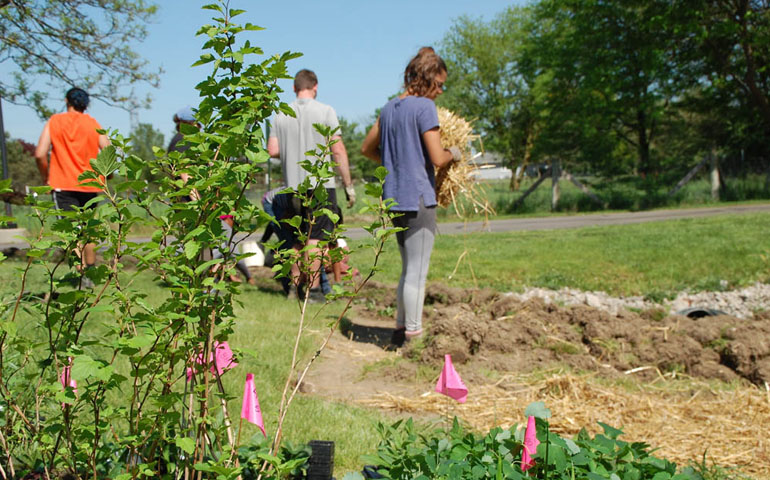
Students from Siena Heights and Barry Universities plant a rain garden in the Adrian Dominicans' permaculture gardens as part of the Environmental Leadership Education program. (Courtesy of the Adrian Dominicans / Ashley LeVigne)
When the Sisters of Charity of Nazareth, Kentucky, updated their mission statement in 1995, they decided at the last minute to add six words to the end: "and to care for the Earth."
An afterthought at the time, those six words now have become integral to everything the international order does.
"We really take that seriously," said Sr. Susan Gatz, president of the community. "We began asking ourselves on every level: How are we helping or hurting the Earth?"
As the years passed and asking that question became part of everyday life, the sisters realized they often didn't know the answer. Or when they thought they knew the answer, they feared it might be incomplete or based on assumptions rather than evidence: Electric vehicles seem like a good alternative, but might not be if your electricity comes from burning fossil fuels.
"If you want to help the Earth instead of hurt it, the question becomes, 'So how do we do it?' " Gatz said. "We wanted to look at everything — water, electricity, recycling."
Sisters have been working to protect the environment and teaching others to protect it for decades. In recent years, many communities have worked to permanently protect their own land holdings from development.
But in 2014, the Sisters of Charity of Nazareth realized they wanted to take their efforts further. They also knew they would eventually need to make decisions about the land and buildings they own: the motherhouse campus that was once home to hundreds of sisters, Nazareth College and Academy, the infirmary, the novitiate and a large working farm. What should the land and buildings be in the future, and, more importantly, how could they be used to help care for the Earth?
"We've done some really good things, but we realized we wanted to go to the next level," Gatz said. "We needed someone in the community whose focus was only that."




